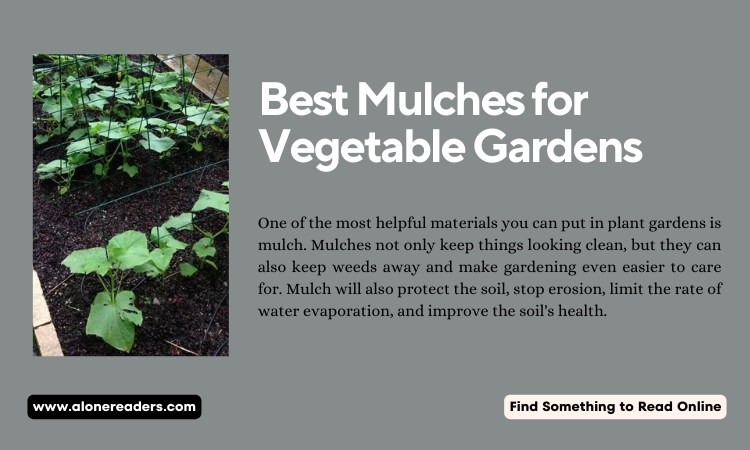
One of the most helpful materials you can put in plant gardens is mulch. Mulches not only keep things looking clean, but they can also keep weeds away and make gardening even easier to care for. Mulch will also protect the soil, stop erosion, limit the rate of water evaporation, and improve the soil's health.
Mulch is a material that covers your soil, ranging from sawdust and grass clippings to rubber and gravel. It reduces soil erosion, maintains constant soil temperatures, suppresses weed growth, and holds onto soil moisture for strong roots.
You can mulch your entire yard, but mulching around vegetable gardens is a particularly advantageous landscaping technique. You'll need to do less weeding and watering, and your sensitive vegetables will benefit from additional protection.
Mulch comes in two types:
Organic mulch (such as compost, pine needles, and leaves): It improves the soil's texture and quality while returning nutrients and organic matter to the soil as it decomposes. This makes it particularly advantageous for plant growth and root health.
Organic mulch is the way to go if you want to provide your vegetables with the greatest soil for long-term growth.
Inorganic mulch (such as gravel, black plastic, and landscape fabrics): It doesn't degrade or decompose very slowly because it was never alive. Your vegetables might benefit from using inorganic mulches because they are far more weed-resistant and durable than organic mulch.
Inorganic mulch is best if you want to avoid weeds without having to reapply it every season.
Mulch has a wealth of advantages for your vegetable garden, including:
Compost
One of the best soil improvements for gardens is compost. You may produce this nutrient-rich mixture of decomposing natural waste on your own using anything from table scraps to grass clippings. Of course, compost can also be produced indoors or in your backyard, making it very affordable or even free to use.
It is a food source and habitat for beneficial bacteria and earthworms that air out your soil, break down organic matter, and produce compounds that prevent plant diseases.
Pros
Cons
Black plastic
The soil is warmed and effectively controlled weeds by a black plastic landscape tarp. When the time comes to plant seeds or dig holes, simply spread them firmly over your soil one to three weeks prior to planting or transplanting.
Heat-loving veggies such as melons, peppers, tomatoes, and okra do well with black plastic. It helps them mature quicker and produce more fruit. Black plastic can raise soil temperatures by up to 5 degrees Fahrenheit.
Pros
Cons
Grass Clippings
To maintain the health of your grass and replace the nutrients in your lawn, it's typically better to keep grass clippings in their natural location. If you have a lot of grass clippings on hand, you can use them to mulch your vegetable garden for free.
This mulch may need to be placed numerous times a year because grass clippings have a high nitrogen content and decompose more quickly than some other mulch options. Only apply 1 to 2 inches of grass clippings at a time, and it's better to let the clippings dry up a little before mulching. Wet grass clippings that are spread out thinly can make a fantastic mulch for container and vegetable plants, however thick layers might clump together and issue with drainage.
Pros
Cons
Straw
Straw is a great material to use as winter mulch. It minimizes frost heaving, preserves moisture, and insulates the soil. To avoid receiving weed seeds with your mulch, make sure to use straw rather than hay and to purchase it from a trustworthy supplier.
Even though straw doesn't have the most attractive appearance, gardeners use it for both winter and spring applications because it's cheap and great at preventing compaction.
Pros
Cons
Shredded Autumn Leaves
If you reside in a region where deciduous trees lose their leaves at the end of the growing season, you already have all the components necessary to create a high-quality organic mulch. Shredded leaves are rich in nutrients that will improve your soil and encourage earthworm activity. Fall leaves are particularly useful because you may gather them just in time for mulching, and many gardeners mulch their planting beds in the autumn.
Pros
Cons
Generally, you should apply mulch ahead of each growing season. However, this will vary on the kind of mulch you use. Grass clippings may require numerous applications throughout the growing season, whereas black plastic can endure for years without needing replacement.
Final word
Certain types of mulch are necessary for vegetable gardens to grow well. For young vegetables, mulch is the ideal safety net. It prevents weeds from growing, protects soil from cold winters, shields plants from illness, and holds moisture in the soil. Mulch is your solution for a green, healthy garden surface.